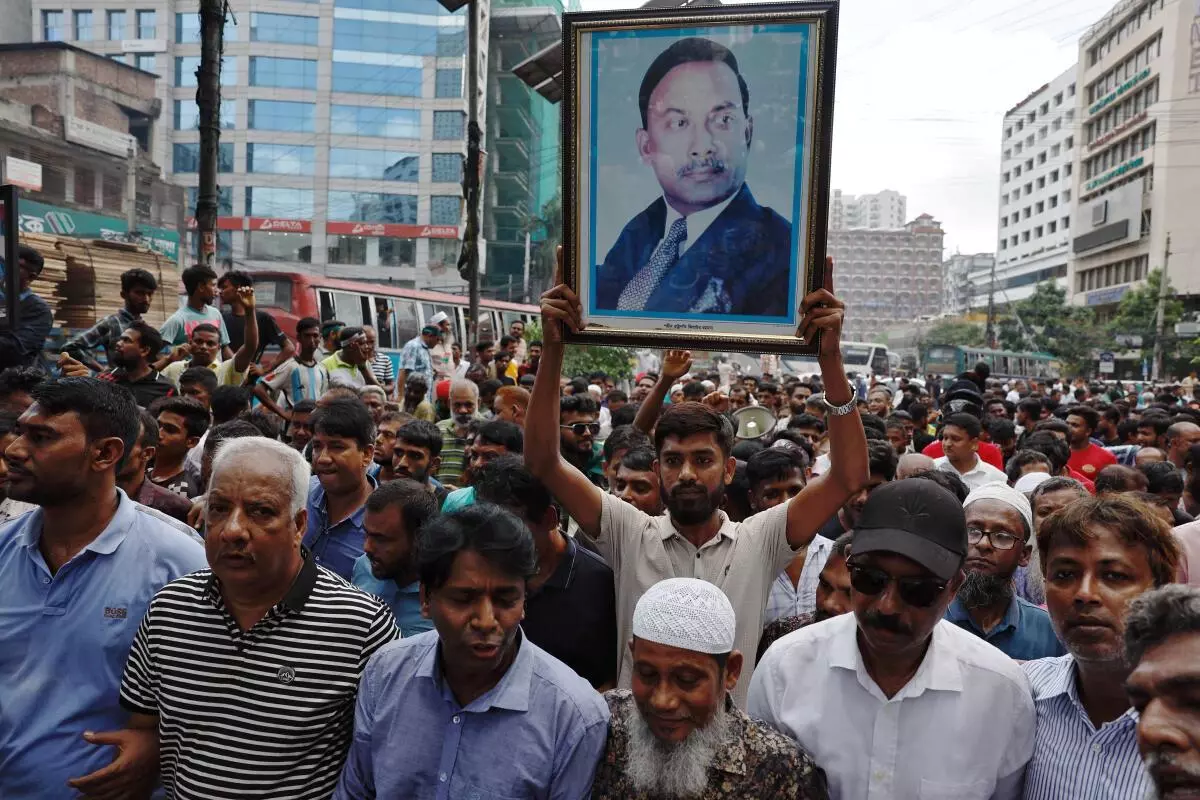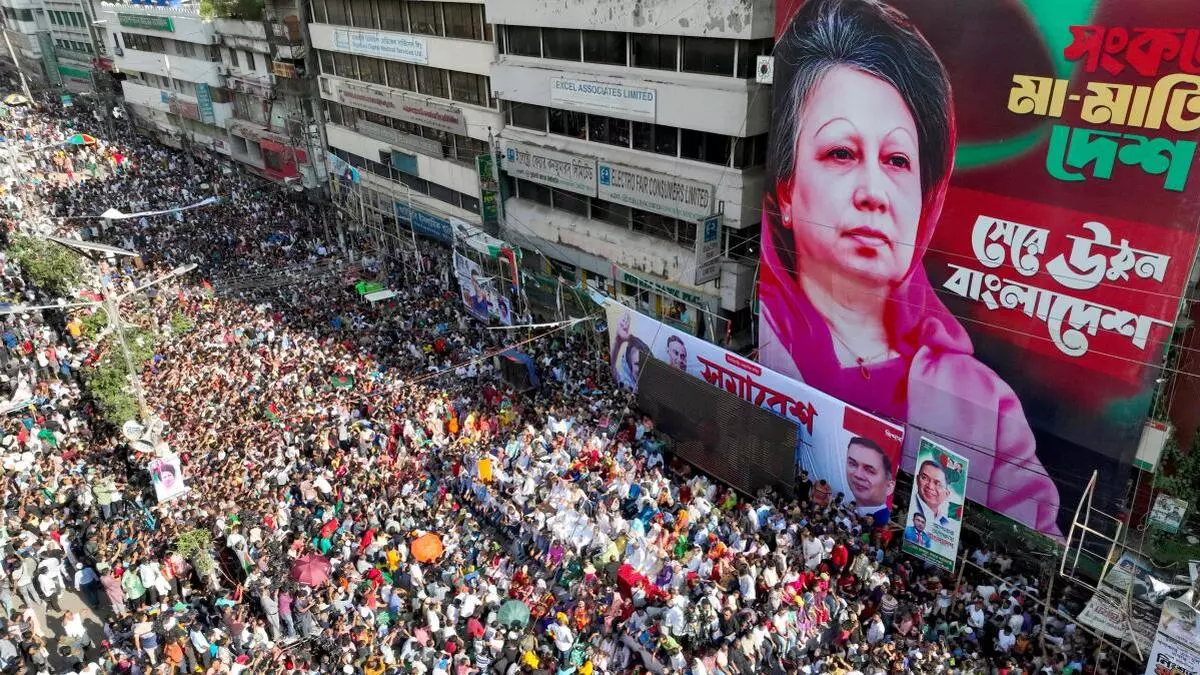The ink on Sheikh Hasina’s resignation paper has barely dried but infighting has already broken out in the Bangladesh Nationalist Party (BNP) as sections of its leaders have begun to jostle for influence and control over lucrative trade unions and other money-making bodies.
Recently, a BNP party worker died after rival factions of leaders clashed in Faridpur. Reports have also emerged on how party workers are rushing to take over the trade unions, markets, and sand mining business, considered to be a lucrative source of income, since they have fallen vacant in post-Hasina Bangladesh.
Earlier, they were under the control of the Awami League leaders. But after Hasina’s dismissal from power most leaders in her party have gone into hiding. Now BNP workers are trying to take control of them.
Endemic corruption in Bangladesh has put the country amongst the world’s most corrupt nations. Out of the eight South Asian countries it ranks just above Afghanistan in the region’s corruption index.
The report of clashes in Faridpur between rival leaders and the resultant death of a party worker has embarrassed the BNP leadership as it flies in the face of its claim to project a clean image.
Also Read | Sheikh Hasina: How the daughter of a slain leader went from democratic hope to authoritarian casualty
Hasina was accused of not only destroying democracy in Bangladesh but also for encouraging rampant corruption in her party and the government.
But reports from several places showed that BNP leaders were trying to continue the corrupt practices of the previous regime.
After the death of its party worker, the BNP has suspended the membership of the two erring leaders in an attempt to stem the rot from spreading across the party. It wants to spruce up its image when elections are announced.
Most people however remain sceptical about the salutary effect of its action on party workers since many of them are desperately seeking to supplement their income from such illegal money-making sources.
Shama Obaid, who was suspended by the party after the clashes, has accepted the leadership’s decision. She claimed that though she was not present during the clash, she was willing to take responsibility for the unfortunate episode since it happened in her area and support’s the leadership’s attempt to reform the party.
Obaid said such incidents were rare and an aberration from what the party was trying to achieve though she admits that the negative reports send out a wrong signal and runs contrary to the party’s goal.
“Hasina was accused of not only destroying democracy in Bangladesh but also for encouraging rampant corruption in her party and the government.”
The BNP is now trying to project itself as the party of choice for Bangladesh people as the absence of Hasina has left the Awami League in total disarray.
Former Prime Minister and BNP’s top leader Khaleda Zia has come out of prison recently after serving six years on corruption charges.
Her son Tarique Rahman, who had self-exiled himself in London to escape prosecution by the Awami League government, is now expected to take charge of the party since Khaleda has been keeping indifferent health.
In her first virtual address to BNP workers, Khaleda has counselled restraint, asking her party to move away from the practices of Hasina’s government and help in creating a corruption free and democratic Bangladesh.
However, reports that have been emerging from different parts of the country about rivalry between leaders coming out in the open suggest that Khaleda will find a serious challenge in enforcing discipline within her own ranks.
“The BNP’s track record on corruption is no better than the Awami League,” says Imtiaz Ahmed, a former professor of political science in Dhaka University.
He points out that since the BNP leaders have been out of power for very long, their source of income has also shrunk significantly. “Many of them are now getting desperate to return to full-fledged political activities and make money,” he added.
According to Ahmed, Khaleda will find it extremely difficult to carry out the reforms in her party if she is serious about implementing them.
Awami League and BNP, traditional rivals
The Awami League and the BNP have been rivals and traditionally fought for the mantle of the leadership of the freedom struggle.
Sheikh Mujibur Rahman had led the country to freedom in 1971. But Mujib and most of his family were killed in a military coup in August 1975.
Hasina and her younger sister Rehana had escaped their fate since they were touring West Germany with Hasina’s husband at that time. She took refuge in India for six years after Prime Minister Indira Gandhi offered her asylum and returned to Bangladesh after restrictions on her entry to the country were lifted in 1981 and she was chosen to lead the Awami League.
However, BNP leaders argue that Ziaur Rahman who founded the party, played an important role too, when he was the first one to announce the birth of independent Bangladesh in a radio address. He had also fought the Pakistan army successfully during the liberation war.


Supporter of Bangladesh Nationalist Party (BNP) holds a picture of former President Ziaur Rahman while joining in a rally, days after the resignation of former Prime Minister Sheikh Hasina, in Dhaka, Bangladesh, on August 7.
| Photo Credit:
Mohammad Ponir Hossain/REUTERS
The Bangladesh Nationalist Party (BNP) came into existence in the wake of Mujib’s assassination. Ziaur Rahman who had retired from the Bangladesh army was brought in to stabilise the country and control the rival army officers who were fighting each other. Subsequently, he became President and through several reforms put the country on the path of economic growth and development.
Ziaur had established the BNP to give himself a more acceptable civilian face and float a political party to rival the Awami League. Khaleda Zia joined politics and became leader of the BNP after Ziaur Rahman was assassinated in a military coup in May 1981.
The BNP‘s inherent tendency has been to move away from Awami League’s legacy and pursue policies that are different from those of its rival. As a result, India-Bangladesh relations in the past under a BNP government have mostly been fraught with tension since Awami League was seen as a close Indian ally.
The BNP had built strong ties with China and Pakistan and also with Islamic religious groups like the Jamaat-e-Islami at home and Islamic countries as part of its foreign policy.
It wanted to showcase Bangladesh’s Islamic identity unlike the Bengali and secular image that the Awami League had tried to promote.
Student factor
Currently in Bangladesh, the students whose protest in support of an even-handed recruitment policy turned into a people’s insurrection and forced Hasina out of power, are the most important force.
Though questions are also being raised about whether the students are mature enough to handle political and other challenges the country faces currently and which may even get bigger in the coming days.
“We must avoid any undue and over simplistic expectation that this generation alone will change everything overnight,” Shamsad Mortuzza, a professor of English in Dhaka University has cautioned in an opinion piece in the Daily Star. Many others hold similar opinions.
The interim government that Nobel Laureate Muhammad Yunus is now heading is currently busy stabilising the situation that has been compounded further with the recent floods submerging vast portions of the country, killing several people and damaging crops and property.
Once the relief and rehabilitation process are over his focus will likely return to bring investment in Bangladesh and revive the economy.
Most political parties, including the BNP, are happy with the interim government, supported by the army, that is now in place in Dhaka and want it to continue for a while and reform the existing system.
Also Read | Bangladesh’s revolution: A surprising lesson in secularism
Though there is no clarity yet on when elections in Bangladesh will be held. But it is widely believed that the BNP is likely to emerge as the dominant party in the future elections.
This raises an important question for Indian policy planners.
Will India-Bangladesh relations be put through a trying time once again if the BNP leads the next government in Dhaka. Or will the logic of geography and economy be able to override past prejudices and allow the two countries to pursue a more cooperative relationship.
The answer to this perhaps will be found in the coming days.
Pranay Sharma is a commentator on political and foreign affairs-related developments. He has worked in senior editorial positions in leading media organisations.

